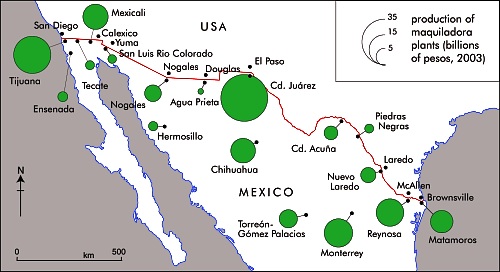The North American Free Trade Agreement (NAFTA), signed in 1994, had a significant impact on the pace and pattern of urbanization in Mexico.
NAFTA removed tariffs on imported corn and beans. Small Mexican producers could not compete with the cheap imports from the USA. As a result, an estimated 1.3 million agricultural jobs in Mexico were lost. Many of those who lost work in rural areas, moved to Mexican cities or to the USA to search for employment. Most of these drifted into the urban informal sector in cities throughout Mexico.
On the plus side, NAFTA created an estimated 500,000 jobs in Mexican manufacturing, mostly maquiladora assembly plants focused on the US market. These plants and their multiplier impacts generated rapid growth in border cities, particularly Ciudad Juárez, Tijuana, Mexicali, Matamoros, Nuevo Laredo, and Reynosa (see map).
Largely as a result of NAFTA, border cities grew faster during the 1990s than most other Mexican cities, essentially reversing the trend that existed during the 1980s. Though after 2000 many of Mexico’s border maquiladora industries moved to lower cost countries, most border cities continued to grow rapidly.
In conclusion, the overall NAFTA impact has strongly stimulated urban growth while fostering rural decline and out-migration.

Sorry, the comment form is closed at this time.